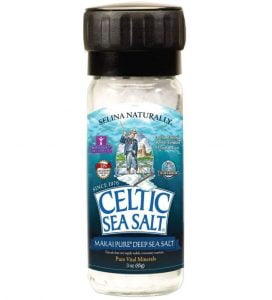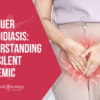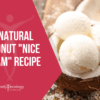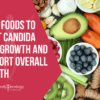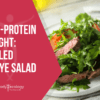Salty deception: What your salt cravings really mean
The science on salt may be misleading: Experts have said that 90 percent of Americans consume way too much salt, putting them at serious risk for heart disease and stroke.1 Scary statistic, don’t you think? What we believe to be even more frightening is that you actually may need more salt than you eat daily. As long as it’s the right kind.
Making sure that you consume adequate amounts of mineral-rich sea salt is crucial to your wellbeing.
Processed foods are laden with the wrong salt
We love the mineral-rich sea salts from Selina Naturally. They introduced us to the healing powers of Hawaiian sea salt, a highly nourishing salt from deep seawater containing ionized sodium, ionized chlorine, magnesium, calcium, potassium, and selenium, plus many trace elements such as copper, iron, zinc, manganese, and chromium missing from common surface water.
As we all know too well, the foods in our American diet are heavily processed. The “salt” used in these foods is not actually salt at all. It’s really refined sodium, with added bicarbonates, chemicals, sugars, and preservatives. The refining process strips the essential minerals (60 trace minerals) from the salt.
Many of the preservatives in table salt (or iodized salt) are not required to be listed on the container and include ferrocyanide, magnesium carbonate, and aluminum hydroxide.
High levels of aluminum are believed to be an inevitable factor in the prevalence of Alzheimer’s in the U.S.2
The bottom line, if you’re eating the standard American diet, then you’re getting too much sodium, and you’re getting it in a form that destroys your health. The good news is that food companies have agreed to lower this unnatural sodium in many of their products. Though this will take time, it’s a necessary step.
In this age of increased heart disease and hypertension, we absolutely agree that you must eliminate refined salt, but if you truly want to improve your health — you must also understand the importance of real sea salt in your diet.
Where to get the good salt to satisfy salt cravings
High-quality sea salt is rich in minerals that (when used properly) help nourish your thyroid and adrenal glands, keep your blood alkaline, and even increase the healing powers of other foods. In fact, sea salt is the most alkalizing food on the spectrum of acid/alkaline. Good sea salt is not simply a condiment but an essential part of a healthy diet.
The Body Ecology System of Health and Healing uses sea salts medicinally to help restore balance in your body.
Here are some examples:
- Sea salt helps support your thyroid and adrenal glands, your most important organs for creating energy.3
- It helps alkalize your blood so that diseases like candida cannot thrive.4
- It helps balance acidic foods like animal proteins, nuts and seeds, and grains, including buckwheat.
- It may add contracting energy to offset expansive foods, like carbohydrates, natural sugars, oils, and algae.
- It also helps balance and add contracting energy to vegan, vegetarian, and raw vegan diets (which are expansive in nature).
Looking for another natural way to reduce your risk of hypertension? Try fermented beets.
There’s a genius within you that understands what foods are best for your body and even what foods combine best with each other for balance. If you’re accustomed to a diet that has “addictive substances” like sugar and caffeine, then you’re going to crave more sugar and caffeine.
You may also be much more likely to crave sugar if your diet doesn’t contain any healthy fermented foods. That’s because your inner ecology (the healthy microorganisms, bacteria, and yeast that live in your gut) won’t be in balance.
Thankfully, when you begin to clean up your digestion, your gut feelings about what to eat become clearer. As you become healthier, you can start to trust your cravings. Cravings in a healthy body — not addicted to sugar, caffeine, casein, and gluten — will let you know when there’s something missing.
Salt cravings can be an important clue or sign that your thyroid and adrenal glands may be in need of minerals. If you satisfy those salt cravings with refined (mineral-depleted) table salt and processed foods, you’ll continue to weaken these vital organs. But, if you choose high-quality sea salts instead — salts that contain an abundance of naturally balanced minerals — you’ll quell those salt cravings and help restore health to your adrenals and your thyroid.
How much is really too much? Salt and your body’s ecology
Body Ecology’s Principle of Balance teaches us that food has energetic properties that create expansive or contracting conditions in your body.
Salt is very contracting in nature:
- When you eat a lot of salty food, you’ll immediately become too contracted.
- To create balance, you’ll then start to crave expansive foods, like carbs with sugar.
Movie theatres benefit from the Principle of Balance. They sell you salty popcorn, knowing that soon you’ll be running back to the concession stand for a sweet, sugary soda. Your inner genius also naturally wants to sprinkle alkalizing salt on more acidic foods like nuts and seeds, animal proteins, salmon, and chicken. Your amazing body is constantly working to achieve this type of balance.
The Principle of Uniqueness tells us that we all have different needs for sea salt. Just as one size does not fit all of us, we don’t all need the same amount of salt each day. Some people are very sensitive to sodium, while others (especially endurance athletes) need more salt to function. In general, men need more than women, and children under the age of 2 need almost none.
Several inherited genes (like AGT and ACE) might make you more salt sensitive. Even with those genes, you may still be able to eat up to a teaspoon of good-quality salt a day. As Selina DeLangre, CEO of Selina Naturally, explains in The Genius of Your Genes Summit, if you don’t eat meat, have been vomiting or sick, or are under stress, you may need a little more salt than normal. If you’re more thirsty than usual, you’re probably overdoing your salt intake. Access her exclusive interview here.
Likewise, ladies, pay attention to your salt intake as you follow your monthly menstrual cycle:
- Cut way back on salt after ovulation. You don’t want to eat a lot of salty foods after you ovulate, or you’ll become too contracted. When the time comes for the lining of your uterus to be shed, you’ll find that you feel uptight and irritable.
- If you eat less salt and your body is in balance, your uterus will relax. Then, the lining will be easily cleansed away.
- Also, be careful of eating too much salt during the days of your period. If you overeat salt then, it can stop the flow of blood, and you won’t have a complete cleansing as nature intends.
- After the lining is shed, you can then increase your use of sea salt a bit to bring on a smooth ovulation. Being a bit more contracted at this time helps your ovaries contract to release the egg.
Experts recommend between 1,600 mg and 2,300 mg of sodium per day for adults, as a general guideline (1 teaspoon of salt provides about 2,000 mg of sodium).
At Body Ecology, we say to follow your own intuition and cravings, as long as you use only high-quality, mineral-rich sea salt to satisfy your salt needs. Listen to your body, and you’ll take in the amount you need as your body seeks balance. (It’s important to know, however, that you cannot correct a mineral deficiency with sea salt. You’ll need to take extra minerals too.)
Too much of any one food can cause imbalances and then health issues. Learn and practice The Principle of Balance, one of Body Ecology’s 7 Universal Principles, and you’ll soon be enjoying just the right amount of sea salt for you.
REFERENCES:
- 1. Sandra L. Jackson, PhD. “Prevalence of Excess Sodium Intake in the United States — NHANES, 2009–2012.” Morbidity and Mortality Weekly Report (MMWR), January 8, 2016 / 64(52);1393-7.
- 2. Chris Exley. Why industry propaganda and political interference cannot disguise the inevitable role played by human exposure to aluminium in neurodegenerative diseases, including Alzheimer’s disease. Front. Neurol., October 2014 DOI: 10.3389/fneur.2014.00212.
- 3. Reinhardt W, Luster M, Rudorff KH, Heckmann C, Petrasch S, Lederbogen S, Haase R, Saller B, Reiners C, Reinwein D, Mann K. Effect of small doses of iodine on thyroid function in patients with Hashimoto’s thyroiditis residing in an area of mild iodine deficiency. Eur J Endocrinol. 1998 Jul;139(1):23-8. doi: 10.1530/eje.0.1390023. PMID: 9703374.
- 4. Schwalfenberg GK. The alkaline diet: is there evidence that an alkaline pH diet benefits health?. J Environ Public Health. 2012;2012:727630. doi:10.1155/2012/727630.

